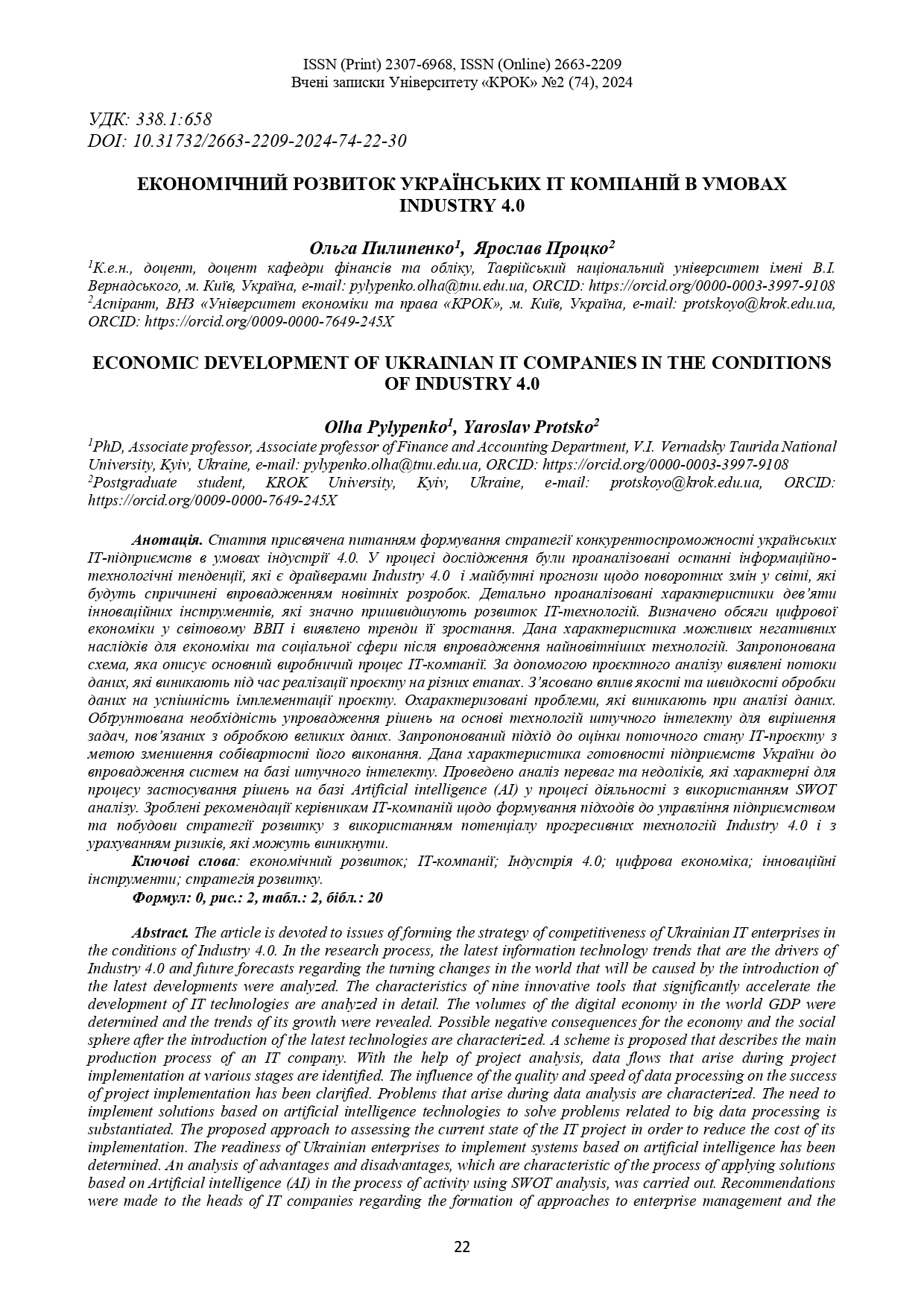ЕКОНОМІЧНИЙ РОЗВИТОК УКРАЇНСЬКИХ IT КОМПАНІЙ В УМОВАХ INDUSTRY 4.0
DOI:
https://doi.org/10.31732/2663-2209-2024-74-22-30Ключові слова:
економічний розвиток, ІТ-компанії, Індустрія 4.0, цифрова економіка, інноваційні інструменти, стратегія розвиткуАнотація
Стаття присвячена питанням формування стратегії конкурентоспроможності українських IT-підприємств в умовах індустрії 4.0. У процесі дослідження були проаналізовані останні інформаційно-технологічні тенденції, які є драйверами Industry 4.0 і майбутні прогнози щодо поворотних змін у світі, які будуть спричинені впровадженням новітніх розробок. Детально проаналізовані характеристики дев’яти інноваційних інструментів, які значно пришвидшують розвиток ІТ-технологій. Визначено обсяги цифрової економіки у світовому ВВП і виявлено тренди її зростання. Дана характеристика можливих негативних наслідків для економіки та соціальної сфери після впровадження найновітніших технологій. Запропонована схема, яка описує основний виробничий процес IT-компанії. За допомогою проєктного аналізу виявлені потоки даних, які виникають під час реалізації проєкту на різних етапах. З’ясовано вплив якості та швидкості обробки даних на успішність імплементації проєкту. Охарактеризовані проблеми, які виникають при аналізі даних. Обґрунтована необхідність упровадження рішень на основі технологій штучного інтелекту для вирішення задач, пов’язаних з обробкою великих даних. Запропонований підхід до оцінки поточного стану IT-проєкту з метою зменшення собівартості його виконання. Дана характеристика готовності підприємств України до впровадження систем на базі штучного інтелекту. Проведено аналіз переваг та недоліків, які характерні для процесу застосування рішень на базі Artificial intelligence (АІ) у процесі діяльності з використанням SWOT аналізу. Зроблені рекомендації керівникам IT-компаній щодо формування підходів до управління підприємством та побудови стратегії розвитку з використанням потенціалу прогресивних технологій Industry 4.0 і з урахуванням ризиків, які можуть виникнути.
Завантаження
Посилання
Ansoff, H.I. (2007). Strategic Management. Palgrave Macmillan UK. https://doi.org/10.1057/9780230590601
Войтко, С.В. (2018). Бізнес-модель Індустрії-4.0 у розвитку приладобудування України. Ефективність інженерних рішень у приладобудуванні : XІV Всеукраїнська науково-практична конференція студентів, аспірантів та молодих вчених (4-5 грудня 2018 року, КПІ ім. Ігоря Сікорського, м. Київ, Україна) : збірник праць конференції / КПІ ім. Ігоря Сікорського, ПБФ, ФММ. Київ : КПІ ім. Ігоря Сікорського. Доступ через: https://ela.kpi.ua/handle/123456789/26370
Войтко, С.В. (2018). Бізнес-модель Індустрії-4.0 у розвитку приладобудування України. Ela.kpi.ua. Доступ через: https://ela.kpi.ua/items/0be8d101-2b56-4f1f-bc06-ac0d39549bae
Cohen, S., Dori, D., & De Haan, U. (2010). A Software System Development Life Cycle Model for Improved Stakeholders’ Communication and Collaboration. International Journal of Computers Communications & Control, 5(1), 20. https://doi.org/10.15837/ijccc.2010.1.2462
Deep Shift (2015). Technology Tipping Points and Societal Impact. Global Agenda Council on the Future of Software & Society. Доступ через: https://www3.weforum.org/docs/WEF_GAC15_Technological_Tipping_Points_report_2015.pdf
Digital Spillover (2017). Measuring the true impact of the digital economy. Huawei, Oxford Economics. Доступ через: https://www.huawei.com/minisite/gci/en/digital-spillover/files/gci_digital_spillover.pdf
Ebert, C., & Louridas, P. (2023). Generative AI for Software Practitioners. IEEE Software, 40(4), 30-38. https://doi.org/10.1109/MS.2023.3265877
Oxford insights. (2023). Gov AI Readiness Index. Oxford Insights. Доступ через: https://oxfordinsights.com/ai-readiness/ai-readiness-index/
Портер, М. (2020). Конкурентна стратегія. Техніки аналізу галузей і конкурентів. Наш формат. Доступ через: https://nashformat.ua/products/konkurentna-strategiya.-tehniky-analizu-galuzej-i-konkurentiv-709318
Pylypenko, O., Matviienko, H., Putintsev, A., Vlasenko, I. & Onyshchuk, N. (2022). Government tax policy in the digital economy. Cuestiones Políticas, 40(72). DOI: https://doi.org/10.46398/cuestpol.4072.15
Rumyk, I. (2023). Digital economy: innovation and technologies. Business model innovation in the digital economy : monograph. Pussi, Estonia. OÜ Scientific Center of Innovative Research. https://doi.org/10.36690/BM-ID-EU
Rumyk, I., & Melnichenko, I. (2023). Development of innovative business companies and Fintech industry in the digital economy. The development of innovations and financial technology in the digital economy: monograph. OÜ Scientific Center of Innovative Research. https://doi.org/10.36690/DIFTDE-2023-170-188
Sauvola, J., Sasu Tarkoma, Klemettinen, M., Jukka Riekki, & Doermann, D. (2024). Future of software development with generative AI. Automated Software Engineering, 31(1). https://doi.org/10.1007/s10515-024-00426-z
Schwab, K. (2016). The Fourth Industrial Revolution. Crown Business. https://archive.org/details/the-fourth-industrial-revolution-klaus-s
Sen, R., Verma, A., Heim, G.R. (2020). Impact of Cyberattacks by Malicious Hackers on the Competition in Software Markets. Journal of Management Information Systems, 37(1), 191-216. DOI: https://doi.org/10.1080/07421222.2019.1705511
Shylesh, S. (2017). A Study of Software Development Life Cycle Process Models. SSRN Electronic Journal. https://doi.org/10.2139/ssrn.2988291
Скоробогатова, Н.Є. (2019). Концептуальні засади формування сталого розвитку суспільства в контексті індустрії 4.0. Економічний вісник Національного технічного університету України “Київський політехнічний інститут,” 16. https://doi.org/10.20535/2307-5651.16.2019.182748
Тесh Ecosystem (2024). Uatechecosystem.com. Доступ через: https://uatechecosystem.com/dashboard
Топ-50 ІТ-компаній України (2023). Літо 2023: мінус 6 тисяч фахівців за півроку, сервісні компанії мають менше клієнтів, продуктові наймають активніше. (n.d.). DOU. Доступ через: https://dou.ua/lenta/articles/top-50-summer-2023/?from=special
What is industry 4-0. (2023). Доступ через: https://www.sap.com/ukraine/products/scm/industry-4-0/what-is-industry-4-0.html

Downloads
Опубліковано
Як цитувати
Номер
Розділ
Ліцензія

Ця робота ліцензується відповідно до Creative Commons Attribution-NonCommercial 4.0 International License.

